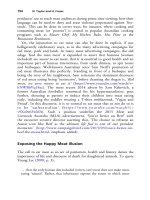The palgrave international handbook of a 307
Bạn đang xem bản rút gọn của tài liệu. Xem và tải ngay bản đầy đủ của tài liệu tại đây (39.13 KB, 1 trang )
304
P. Squires
shooting no-longer commercially viable. Land management and gamekeeping then ceased, and during this second research phase hen harrier
numbers fell significantly as other predators (foxes and crows) began to
their toll of harrier nests. Hen harrier survival rates and population levels
were higher when the estate was properly (and legally) managed. Baines
and Richardson (2013, p. 1402) concluded ‘we consider this study to be
the first that quantifies how control of generalist predators as part of grouse
moor management can benefit harrier productivity’. They argue that the
research points to the importance of finding ways to ensure grouse moors
are effectively managed for a diversity of wildlife, while remaining economically viable. ‘If techniques can be devised and put in place to reduce
the impact of harriers on grouse, then the control of generalist predators
may be viewed as a more acceptable component of conservation management for ground-nesting birds’ (2013, p. 1365). If this seemingly ‘win-win
situation’ could be deployed in other contexts and cases, thereby ‘reducing
the motivation behind the persecution of [rare bird] species’ (Amar et al.
2012, p. 93), it might also herald the development of more considered or
consensual strategies for land management. But that would be a much
bigger issue.
It has to be said, such ‘strategies’ are unlikely to find favour amongst those
fundamentally opposed to all manner of field sports shooting, but it may
have particular implications for driven shooting: the particular form of live
animal shooting comprising the most high volume slaughter. Furthermore,
if, as Thompson et al. (2009, p. 950) have suggested, driven grouse shooting
is ‘only viable when birds of prey are routinely disturbed and killed’ then it
becomes appropriate to question ‘the legitimacy of driven grouse shooting as
a sustainable land use’. And they conclude, ‘Moorland owners need to
consider more broadly sustainable shooting practices for the 21st century’
(Thompson et al. 2009, p. 950). The argument they make here becomes
especially compelling where the shooting estates in question receive public
subsidies for their land management; greater accountability here may bring a
range of social and environmental benefits.
Driven To It?
As we have seen, driven shooting, involves beaters driving birds towards a
line of eight to ten guns, the birds being shot as they fly high over the
shooting line. Safety and etiquette, apparently, demand that the shooters fire
only upwards and forwards of the line. Driven grouse shooting is said to be









